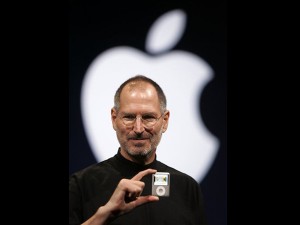WASHINGTON—Apple Inc. cofounder Steve Jobs revolutionized multiple industries with his cutting-edge products but he was not the world’s best manager, according to biographer Walter Isaacson.
Jobs changed the course of personal computing during two stints at Apple and then brought a revolution to the mobile market, but the inspiring genius is known for his hard edges that have often times alienated colleagues and early investors with his my-way-or-the-highway dictums in his quest for perfection.
“He’s not warm and fuzzy … He was not the world’s greatest manager. In fact, he could have been one of the world’s worst managers,” Isaacson said on Sunday in an interview with “60 Minutes” on CBS.
“He was very petulant. He was very brittle. He could be very, very mean to people at times,” Isaacson said of Jobs, who died on October 5 at the age of 56.
“Whether it was to a waitress in a restaurant or to a guy who had stayed up all night coding, he could just really just go at them and say, ‘You’re doing this all wrong. It’s horrible.’ And you’d say, ‘Why did you do that? Why weren’t you nicer?’ And he’d say, ‘I really want to be with people who demand perfection. And this is who I am,”’ the biographer said.
“You know, he was a pretty abrasive, and in some ways, you know, a cantankerous character,” Isaacson said.
Job’s quest for perfection came in part from his adopted father, Paul Jobs, who taught him “how to make great things,” the biographer said of the man who devised the Macintosh computer, the iPod, the iPhone and the iPad during his brilliant career.
“Once they were building a fence. And he said to his father, ‘You got to make the back of the fence that nobody will see just as good looking as the front of the fence,’” Isaacson said. “That will show that you’re dedicated to making something perfect.’”
Brutally honest
Jobs loved to argue but not everyone around him shared that passion, which drove some of his top people away. While his style had yielded breakthrough products, it didn’t make for “great management style,” Isaacson said.
In one of the more than 40 interviews that Jobs had given the biographer, the technology icon said he felt totally comfortable being brutally honest.
“That’s the ante for being in the room. So we’re brutally honest with each other and all of them can tell me they think I’m full of s**t, and I can tell anyone I think they’re full of s**t,” Issacson quoted Jobs as saying. “And we’ve had some rip-roaring arguments where we’re yelling at each other.”
Isaacson’s biography, “Steve Jobs,” which hits bookstores on Monday, reveals that Jobs refused potentially life-saving cancer surgery for nine months, suffered bullying in school, tried various quirky diets as a teenager and exhibited early strange behavior such as staring at others without blinking.
The book is expected to paint an unprecedented, no-holds-barred portrait of a man who famously guarded his privacy fiercely but whose death ignited a global outpouring of grief and tribute.
Attitude toward money
Isaacson said Jobs, despite being worth billions of dollars, lived in a modest house in Palo Alto and was determined not to let money change him.
In a taped interview for the book, Jobs told Isaacson a lot of people had changed at Apple after becoming wealthy.
“A few people went out and bought Rolls-Royces and they bought homes, and their wives got plastic surgery,” Jobs said in the interview.
“I saw these people who were really nice, simple people turn into these bizarro people,” he added. “And I made a promise to myself: ‘I’m not going to let this money ruin my life.’”
‘Magical thinking’
In the CBS interview, Isaacson said that the reality distortion theory that had always been associated with Jobs stemmed from the Apple cofounder’s belief that he was special and that the rules didn’t apply to him.
“He could drive himself by magical thinking,” Isaacson said. “By believing something that the rest of us couldn’t possibly believe, and sometimes it worked, sometimes it didn’t.”
After Jobs became ill with pancreatic cancer in 2003, he “no longer wanted to go out, no longer wanted to travel the world,” Isaacson said.
“He would focus on the products,” the biographer said. “He knew the couple of things he wanted to do which was the iPhone and then the iPad.”
Jobs, who has revolutionized the world of personal computers, animated movies, music, phones, tablet, digital publishing and retail stores, would have liked to conquer television as well, according to Isaacson.
“He had a few other visions. He would love to make an easy-to-use television set,” Isaacson said, speaking of Job’s last two-and-a-half years of life.
“But he started focusing on his family again as well. And it was a painful brutal struggle. And he would talk, often to me about the pain.”
God and afterlife
In his final meeting with Isaacson in mid-August, Jobs still held out hope that there might be one new drug that could save him. He also wanted to believe in God and an afterlife.
“Ever since I’ve had cancer, I’ve been thinking about (God) more. And I find myself believing a bit more. Maybe it’s because I want to believe in an afterlife. That when you die, it doesn’t just all disappear,” Isaacson quoted Jobs as saying.
“Then he paused for a second and he said, ‘Yeah, but sometimes I think it’s just like an on-off switch. Click and you’re gone,’” Isaacson said.
“He paused again, and he said: And that’s why I don’t like putting on-off switches on Apple devices.” Reports from Reuters and AFP
